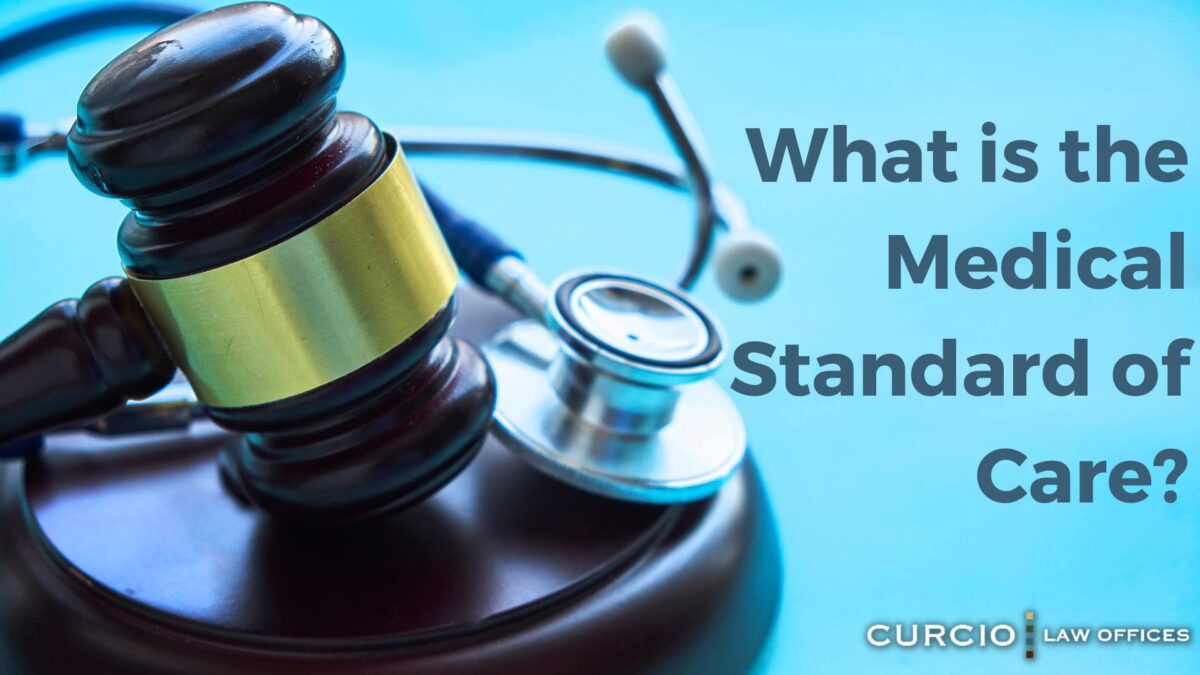All personal injury lawsuits require proof of negligence and lack of duty of care; medical malpractice cases are no different. In the medical field, doctors and other healthcare professionals must provide their patients with the medical standard of care, similar to the standard duty of care of personal injury law.
If you were injured because your doctor failed to meet the medical standard of care, you have the right to pursue a medical malpractice claim. Any type of negligence can cause harm to others, but when a doctor commits negligence, the consequences could be catastrophic. Medical negligence can often lead to life-long injuries, chronic pain, and in severe cases, paralysis and death.
Curcio & Casciato has been providing legal representation for Chicago residents since 1957. For years, our attorneys have fought for our client’s rights and helped them receive fair compensation for their injuries, and we are ready to do the same for you. To schedule a consultation with the Chicago medical malpractice attorneys, call 312-321-1111 today.

What is Medical Malpractice?
Healthcare providers have a legal liability for providing the best medical care to their patients, established under the medical standard of care. Medical malpractice occurs when they fail to uphold the medical standard of care. By acting negligently, the doctor has caused harm or injury to their patient that would not have happened had another average doctor provided treatment.
Medical negligence claims are extremely difficult to prove, so you need an experienced medical malpractice lawyer to represent you.
Common Types of Medical Malpractice in Chicago
Unfortunately, with any type of medical treatment, there is room left for errors. Mistakes can happen whether you’re undergoing a simple surgical procedure or visiting a doctor to receive a diagnosis. However, medical malpractice occurs when those mistakes are made due to negligence and cause harm to patients. Medical malpractice can happen in all areas of the medical field, but we’ll list the most common types below.
Failure to Treat
When a patient receives a diagnosis for their ailment but is never treated for that diagnosis, their doctor has failed to treat them. Failure to treat can happen when a patient is discharged too soon, the proper follow-up care is not provided, and the medical standard of care necessary for the diagnosis is not provided. When trying to prove failure to treat, you must be able to show that any other competent doctor would have provided treatment for your diagnosis.
Medical Misdiagnosis
If a doctor does not recognize a patient’s symptoms and make an accurate diagnosis in a timely manner, they’ve misdiagnosed them. This type of medical malpractice claim is common and can often lead to more medical malpractice errors like the wrong treatment or the wrong medication. (We provide more information on this here: Can you sue a doctor for prescribing wrong medication.)As a patient’s condition worsens due to the misdiagnosis, it can be challenging to treat the further it progresses. A misdiagnosis can lead to wrongful death depending on the severity of the patient’s medical condition. To prove your doctor misdiagnosed your medical condition, your Chicago misdiagnosis lawyer will need to show that an average provider would not have missed the diagnosis.
Delayed Diagnosis
Similar to a misdiagnosis, when healthcare professionals take too long to diagnose an ailment or medical condition due to negligence, they’ve committed malpractice. If your doctor ignores the clear signs that there is something wrong or incorrectly diagnosed the ailment the first time, you could have a case for delayed diagnosis. One way you can prove delayed diagnosis occurred is if your doctor failed to order tests that would have shown the medical issue.
Birth Injuries
Sadly, many birth injuries are preventable and caused by negligence by the health care professional during a mother’s pregnancy, delivery, or in the short period following the delivery. When doctors ignore the signs that the baby and/or mother are in distress or other complications related to pregnancy and childbirth, the consequences can be devastating. Common birth injuries caused by negligence are nerve damage, shoulder dystocia, cerebral palsy, spastic hemiplegia, spinal cord injuries, and more. If this happened to your family, our Chicago birth injury lawyers can help.
Surgical Errors
This type of medical malpractice can often be confused with lack of informed consent about a medical procedure. (Learn more about informed consent here: What is informed consent?) Before undergoing any medical procedure, healthcare professionals must tell you all the associated risks. If you continue with the surgery anyway and suffer from those risks, then you do not have a medical malpractice case. Common surgical errors that can lead to a medical malpractice claim are listed below.
- The surgery was not necessary.
- The wrong surgical procedure was performed.
- The surgical instruments were not properly sterilized.
- Avoidable damage was done to major organs, tissue, or nerves.
- The surgeon did not perform proper hygiene before the surgery.
- Surgical instruments or tools were left inside the patient.
- The post-op care was not adequate.
Anesthesia Errors
When the anesthesiologist makes a mistake, the patient can be left with permanent brain damage, pain, or even death. Anesthesia is vital to every surgical procedure and is responsible for keeping a patient unconscious and pain-free. If your anesthesiologist does not properly monitor vital signs or incorrectly administers the anesthesia due to negligence, they have committed medical malpractice. Anesthesia errors can also happen if the doctor or anesthesiologist fails to provide the patient with proper pre-op and post-op instructions, leading to injury.
Prescription Drug Errors
This type of medical malpractice is often related to misdiagnosis, but that’s not the only way a prescription error can happen. Medication errors can also happen if the wrong dosage is prescribed or the wrong prescription is filled. Medication errors can sometimes have severe consequences if a patient takes another drug with adverse side effects when mixed together. Patients put their trust in pharmacists and that they’re handing them the exact medication their doctor ordered. Medication errors can be proven by showing that the incorrect medication was prescribed or that the wrong drug was taken due to a mistake by the pharmacist.
Failure to Prevent or Treat Infections
Infections can often occur following a medical procedure, but the infection should go away quickly with proper care. However, if your infection was caused by poorly sterilized equipment or an unsanitary environment, then negligence occurred, which led to your infection. When your medical provider fails to treat your infection, the consequences can be life-threatening, especially if sepsis sets in.
If you’ve experienced any of the above types of malpractice, you could have grounds to pursue a medical malpractice lawsuit. To discuss your medical malpractice case with one of our Chicago personal injury attorneys, call Curcio & Casciato today.

What is the Medical Standard of Care?
The medical standard of care is the level of care that any reasonably competent specialist with a comparable education level in the same medical area would provide to a patient under the same or similar circumstances in which the alleged malpractice occurred. To prove the medical standard of care in your medical malpractice case, you need to show that other healthcare professionals within the same field would not have committed negligence if they provided your treatment.
Several factors are considered when establishing the medical standard of care that a patient should receive. The doctor’s medical knowledge and specialty are both evaluated, as well as the standard of care in the same or similar community. The medical standard of care can vary depending on the situation and where the situation occurs. Generally, the following factors are considered when determining the medical standard of care.
- The doctor’s specialty and medical knowledge.
- How an average healthcare professional within the same field would have handled the treatment.
- The doctor’s level of skill compared to other medical professionals in the same practicing area.
- What the accepted and traditional medical practices are.
If your doctor or other health care professional did not provide you the same treatment that any other competent physician would provide under the same or similar circumstances, then they failed to meet the medical standard of care.

Establishing the Medical Standard of Care in Chicago Medical Malpractice Cases
Successful medical malpractice cases heavily depend on assistance from experienced medical professionals who can evaluate the case and medical records. These medical professionals will testify regarding the medical standard of care under particular circumstances and how your case deviated from that.
Anyone filing a medical malpractice case in Illinois is required to file a certificate of merit at that time. Since medical malpractice lawsuits are more complex than normal personal injury ones, they need the certificate merit to prove that the case has merit. In other words, by filing the certificate of merit, the medical malpractice plaintiff is proving to the courts that a qualified medical professional has evaluated the case and decided that the medical standard of care was not met. The certificate of merit requirement helps decrease the number of cases that don’t have merit where no malpractice occurred.
To receive a certificate of merit for your medical malpractice case, the health care professional must:
- Be knowledgeable about the medical issue.
- Currently practice or has practiced medicine within the previous year.
- Practices medicine in the same field.
- Be proven competent or experienced based on their qualifications.
- Find that the case had merit and reasonable cause, which is determined by the victim’s medical records.
Can You Sue for a Medical Error That Didn’t Result in an Injury?
If medical negligence occurred, but you did not suffer any injury or financial loss, you cannot pursue a medical malpractice case. These cases are pursued so those injured from medical negligence can receive financial compensation. If you didn’t suffer any loss or injury, it’s hard to prove that any damage occurred, which means there’s nothing to compensate for.
There are exceptions, however, if the injury occurred later or you only suffered financial losses. To understand whether you have a malpractice case without injury, it’s important to determine what type of medical malpractice happened and how it impacted you financially.
To determine whether you have a medical malpractice case, call Curcio & Casciato to talk with one of our personal injury attorneys. We’ll evaluate your medical case and determine whether you have the grounds to pursue legal action.
Medical Malpractice Damages
Chicago personal injury attorneys at Curcio & Casciato have helped their clients receive the following damages for their medical negligence cases:
- Medical expenses, both past and future
- Physical therapy
- Lost wages
- Loss of earning capacity if the injured cannot return to their job at the same level as before their injury.
- Pain and suffering
- Scarring, disfigurement, and/or disability
- Loss of enjoyment of life
If medical negligence resulted in the wrongful death of a family member, you could be entitled to compensation for damages that include the average cost of funeral expenses, burial expenses, and loss of benefits.
Illinois Statute of Limitations for Medical Malpractice
The statute of limitations in Illinois for medical negligence cases is two years from the date the injury occurred. If your injury is found later on and the statute of limitations has passed, you have no more than four years to file. Extenuating circumstances can still allow you to file a medical malpractice case, so it’s important to discuss your claim with a personal injury attorney. Even if the statute of limitations has passed, you could potentially still have the ability to file a lawsuit.

Call a Chicago Medical Malpractice Lawyer at Curcio & Casciato Today
The medical malpractice attorneys at Curcio & Casciato have over 60 years of experience handling personal injury and medical negligence lawsuits. Over the years, we’ve successfully recovered millions of dollars in compensation for our Chicago clients’ medical malpractice cases. If you suffered injuries due to medical negligence, you can pursue legal action to receive financial compensation for your injuries. To schedule a free consultation with one of our Chicago medical malpractice attorneys, call Curcio & Casciato at 312-321-1111 today.



